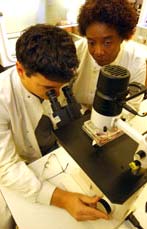Genes to be ’flipped’ for drug-free treatment

Dr Graham Cook and Dr Erica de Wynter from the Molecular Medicine Unit, University of Leeds
The body’s own defences could be programmed to attack disease to order if two University of Leeds’ scientists succeed in proving their innovative theory.
Dr Graham Cook and Dr Erica de Wynter from the Molecular Medicine Unit have secured £125,000 to investigate the unique way antibody genes are assembled and how they can be harnessed to fight disease.
Scientists don’t often get funding for research where there is no preliminary data or background information but the pair have been funded by the Wellcome Trust’s Showcase scheme to research new ways to repair damaged immune systems.
Their research into ‘flipping genes therapy’ met the Trust’s criterion of being ‘speculative, novel, adventurous, innovative’.
Dr Cook said antibodies can be made to respond to every kind of pathogen. “Antibodies are created by taking bits of genes and reassembling them into different combinations, like a giant Lego set. If we can understand the mechanism by which genes are ‘flipped’ in this way, we can insert genes for the body to naturally rearrange, delivering treatments directly to the immune system.”
If their idea works, it could open the door to new therapies for treating immune-deficiency disorders and even provide a treatment for cancers of the immune system, by adding genes to make the cancerous cells die.
“The benefit of this kind of treatment is that it would use the cell’s natural mechanism to help fight disease,” said Dr de Wynter. “Our body uses this system to produce diversity, an insurance system against the ever changing pathogens it has to fight. Our problem is we want to specify the mechanism to create just one antibody, and while we believe it can work, we’ve now got to prove it. We think we can prove our idea is possible in the next two years.”
Media Contact
More Information:
http://reporter.leeds.ac.uk/498/s4.htmAll latest news from the category: Health and Medicine
This subject area encompasses research and studies in the field of human medicine.
Among the wide-ranging list of topics covered here are anesthesiology, anatomy, surgery, human genetics, hygiene and environmental medicine, internal medicine, neurology, pharmacology, physiology, urology and dental medicine.
Newest articles

High-energy-density aqueous battery based on halogen multi-electron transfer
Traditional non-aqueous lithium-ion batteries have a high energy density, but their safety is compromised due to the flammable organic electrolytes they utilize. Aqueous batteries use water as the solvent for…

First-ever combined heart pump and pig kidney transplant
…gives new hope to patient with terminal illness. Surgeons at NYU Langone Health performed the first-ever combined mechanical heart pump and gene-edited pig kidney transplant surgery in a 54-year-old woman…

Biophysics: Testing how well biomarkers work
LMU researchers have developed a method to determine how reliably target proteins can be labeled using super-resolution fluorescence microscopy. Modern microscopy techniques make it possible to examine the inner workings…





















